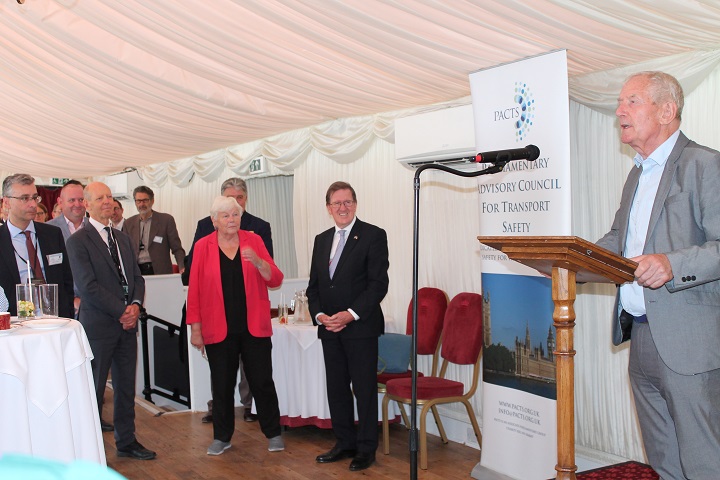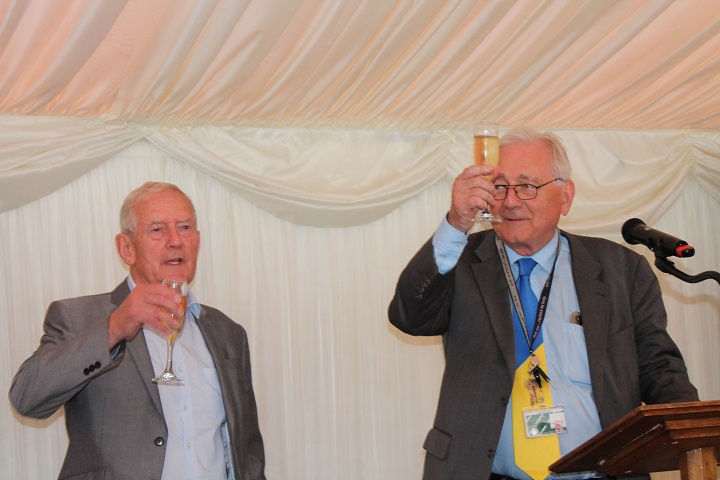
PACTS has renewed and reinstated its vision to create “a transport system free from death and life-changing injury, in which all users feel safe”.
To mark its 40th anniversary, the organisation has published a new document, outlining the four strategic aims that will help to achieve this goal. This was presented by PACTS chair Tony Ciaburro.
Among these aims is to continue to proactively influence change. PACTS has a track record of advocating for improvements in transport safety at home and abroad; from pioneering work on seat belt legislation four decades ago, to the recent establishment of a Road Safety Investigation Branch.
PACTS pledges to ‘pursue the most effective ways to promote the right issues at the right time and press for the changes that are needed’.
The other strategic aims are to:
- Grow a valued and well supported membership
- Secure strong parliamentary participation and engagement
- Identify and research the right subjects at the right time
The vision statement describes each aim in detail, along with the substantive programme of activities that are currently established and underway, together with new initiatives that will be undertaken.
It also explains how PACTS hopes to work more with the devolved governments and administrations, and promote diversity.
Barry Sheerman MP, president of PACTS, said: “PACTS has much to be proud of, but our work is far from done. To say the UK has some of the safest roads in the world is no comfort to the tens of thousands of our fellow citizens killed or injured each year.
“Nor is it good enough for those who are deterred from travelling because they are concerned about the dangers that may be involved, whether their journeys are by road, rail or air. We believe in safe transport for all. We must raise the bar.
“I am delighted that PACTS has reviewed its vision and strategic aims. We believe in partnerships, passion and professionalism to deliver real change. We will continue to work with all those who share our vision.”
PACTS celebrates its 40th anniversary
Given everything we know today, it feels somewhat inconceivable that there was ever a time when the wearing of seatbelts was not mandatory.
But of course, that was the case as recently as the 1980s – a time when the UK averaged around 6,000 road deaths per year.
It was an issue that ultimately led to the founding of the Parliamentary Advisory Council for Transport Safety – the organisation we refer to today as PACTS.
Spearheaded by the effervescent Barry Sheerman, the group of parliamentarians, road safety professionals, casualty surgeons and academics came together to press the case for this life-saving change in the law.
Their efforts resulted in the 1981 Transport Act, which meant that seatbelt wearing became a legal obligation.
Success, but not job done.
The group recognised the value of continuing to raise the profile of road safety in both houses of Parliament, and set about its goal of giving evidence to provide the basis for other improvements in transport safety policy.
To do this, PACTS constituted itself formally in 1982 – meaning this year the organisation is celebrating its 40th anniversary.
On 14 July, the road safety sector gathered in Westminster to mark the occasion – celebrating the achievements of PACTS both at home and abroad over the last four decades.

This includes influencing seat belt laws in the USA – and supporting countries like Thailand in their quest to reduce road fatalities.
But speakers at the event, including Barry Sherman himself, stressed the importance of maintaining focus in the coming years, as the transport industry undergoes significant changes.
For example, one area PACTS has been heavily involved with in recent times is e-scooters.
Throughout 2021, PACTS gathered data of casualties involving e-scooters (riders and other road users) collected from the media, police forces and insurance firms.
The aim of the project was to gather information on the safety of private e-scooter use – in a bid to inform any future policy decisions.
It’s this desire and ability to place evidence at the heart of transport policy which makes PACTS such a valuable asset to the road safety industry.
The organisation’s work on many key issues has without doubt contributed to a substantial number of lives being saved over the past 40 years – and with its new vision statement, PACTS will continue to play a leading role as the UK strives towards zero road deaths.
Comment on this story